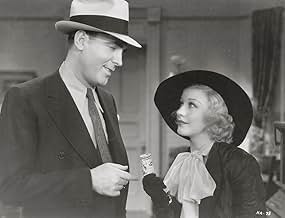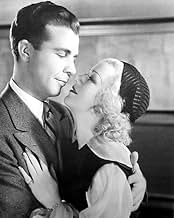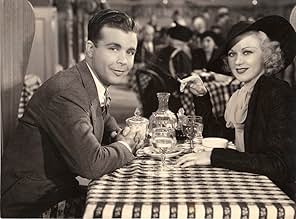Adicionar um enredo no seu idiomaUnscrupulous agent Rush makes singing waiter Clayton a big radio star while Peggy, who has lost her own radio show, helps Clayton.Unscrupulous agent Rush makes singing waiter Clayton a big radio star while Peggy, who has lost her own radio show, helps Clayton.Unscrupulous agent Rush makes singing waiter Clayton a big radio star while Peggy, who has lost her own radio show, helps Clayton.
- Direção
- Roteiristas
- Artistas
- Prêmios
- 1 vitória no total
- The Mills Brothers
- (as The Four Mills Bros.)
- Ted Rio Rita and His Orchestra
- (as Ted Fio Rito and His Band)
- Herbert Brokman
- (as Joseph Cawthorne)
- Three Mimics
- (as The Three Radio Rogues)
- One of the Three Radio Rogues
- (as Jim Hollingwood)
Avaliações em destaque
Dick Powell plays Buddy Clayton, a singing waiter in a beer garden discovered by the slippery fast-talking talent scout Rush Blake (Pat O'Brien). Rush takes Buddy back east where he becomes a radio singing sensation and heartthrob, although it does take awhile and a few odd quirks of fate. In the meantime, Buddy has started up a romance with singer Peggy Cornell (Ginger Rogers) that is leading to the altar, but the sponsor of the radio show on which Buddy sings says that a married heartthrob is no heartthrob at all, and instructs Rush to talk the pair out of marriage. This split is at first amicable and temporary, but then Rush dreams up a publicity stunt that misfires hilariously.
The film features the music and lyrics of Warren and Dubin, the comic support of familiar Warner contract player Allen Jenkins, and the direction of Ray Enright who managed to get this one right - it's funny in all the right places without being inane.
They really put a damper on Ginger Rogers' performance this time. After playing the tough precode chorine in the earlier Berkeley musicals, here they've turned down the volume on her sauciness a couple of notches. Plus, in anticipation of the production code, the romance between Peggy and Buddy is squeaky clean. There is no taking a can opener to metal bathing suits or checking into the Honeymoon Hotel in this musical as there was the previous year.
Highly recommended as a pleasant way to spend 90 well-paced minutes.
The story begins in Los Angeles where Russell "Rush" Blake (Pat O'Brien), a smooth talking talent scout for Consolidated Broadcasting, with a reputation of discovering such great entertainers as Russ Columbo and Bing Crosby, is dining at Perry's Brass Rail, a beer garden, where he comes across Buddy Clayton (Dick Powell), a singing water. After getting Clayton fired from his job, Rush makes amends by getting him to return to New York City with him on the promise of a singing career on the radio. As Rush is making arrangements for an audition, Clayton strolls through the radio station and encounters Peggy Cornell (Ginger Rogers), the "Cinderella Girl," who takes an instant dislike towards him for making funny faces on the glass window as she is trying to sing. Later, Clayton goes on with his audition, but fails, thus, no contract negotiations. With the help of Peggy, who now likes him, she succeeds into getting Clayton a second chance when it is realized that Clayton could put it over better with love songs. He goes on the air and becomes a success. With Buddy and Peggy now in love, it is up to Rush to prevent the couple from getting married so that Clayton can go on with his successful radio career, which then causes plenty of problems.
With music and lyrics by Harry Warren and Al Dubin, the songs featured include: "The Man on the Flying Trapeze" (traditional circus song sung by Dick Powell); "The Last Wind-Up" (sung by Eddie Foster, Billy Snyder, Matt Brooks and Morris Goldman); "Yes, I Heard" (sung by The Mills Brothers); "Out for No Good" (sung by Ginger Rogers); "How Am I Doing?" (The Mills Brothers); "The Man on the Flying Trapeze" (reprise by Powell); "I'll String Along With You," "I'll String Along With You" (reprise, both sung by Powell); "Fair and Warmer" (Powell); "Out for No Good" (Powell and The Mills Brothers); "Fair and Warmer" (instrumental by Ted Fio Rito and his Orchestra); "What Are Your Intentions?" (sung by The Debutantes and Ted Fio Rito); "I'll String Along With You" (Powell and Rogers) and "I'll String Along With You" (reprise by Powell). In the very opening of the movie, the camera focuses on various radio sets with the Three Radio Rogues, given screen credit for their unseen but heard performance, musically and comically doing their imitations of then popular radio stars of the day including Ben Bernie, Kate Smith, Arthur Tracy, Rudy Vallee, Amos and Andy, Joe Penner, Morton Downey and Bing Crosby.
"Twenty Million Sweethearts" is Warner Brothers answer to Paramount's radio musical satire, "The Big Broadcast" (1932), which also presented The Mills Brothers in song numbers, but didn't have the silliness that Paramount presented. "Sweethearts," a promotional showcase for Dick Powell, who was by then riding high in popularity in screen musicals, starts off well and funny, becomes mediocre somewhere in the middle but picks up again near the end. Although successful with its 1934 audiences, Warners reworked the plot element of "Sweethearts" again the following year with "Broadway Gondolier" (1935), with Joan Blondell, and using the same radio personalities as Ted Fio Rito and The Mills Brothers once more. Of the two, "Sweethearts" is better because of the chemistry between Powell and Rogers. The two had earlier appeared in two classic backstagers, "42nd Street" and "Gold Diggers of 1933" (both 1933), with Powell romancing Ruby Keeler, and Rogers in the supporting category as a wisecracking chorus girl. This time she not only keeps up with the wisecracks, but is elevated to Powell's co-star and succeeds as both singer and actress. Rogers would soon prove herself star material after becoming Fred Astaire's co-star and dancing partner in a series of successful musicals for RKO Radio throughout most of the Depression '30s.
The supporting cast of "Sweethearts" consists of character actors as the heavily accented Joseph Cawthorn; the hot-tempered but sophisticated Grant Mitchell; the simple-minded Henry O'Neill; the raspy-voiced Allen Jenkins as the star of a kiddie program; and everybody's male secretary, Johnny Arthur.
Portions of "Twenty Million Sweethearts" were reworked again by Warners with its Technicolor production of "My Dream is Yours" (1949) starring Jack Carson in the role originated by O'Brien, with Doris Day as the vocalist. The remake even includes the old tune of "I'll String Along With You," which, in spite of several reprises in the original, remains one of the best songs ever written for the musical screen.
"Twenty Million Sweethearts" is not available on video cassette at present, but can be seen on Turner Classic Movies. The movie is of sole interest not only to Powell and Rogers fans, but to those curious about the atmosphere of the world of radio broadcasting way back when. (***1/2)
Pat O'Brien has one of his wheeler-dealer roles as Russell Blake, an agent who's not delivering the great talent he's promised his boss but keeps getting pay advances nonetheless. Finally he's fired. However, at a restaurant, he hears a singing waiter, Buddy Clayton (Dick Powell) do a goofy "The Man on the Flying Trapeze" and brings him to the attention of the radio station. Reluctantly, his boss (Joseph Cawthorne) gives Buddy an audition - and is immediately sorry. Admittedly it's hard to hear Buddy's real voice singing the Flying Trapeze song.
Eventually, however, everyone hears Buddy sing and a radio show sponsor wants him. The current singer, Peggy Cornell (Ginger Rogers) clicks with Buddy, which makes for complications.
The score by Dubin and Warren is very good, as well as other songs, and there are performances by the Mills Brothers, bandleader Ted Fio Rito, Ginger Rogers, and The Radio Rogues.
The versatile Dick Powell had a beautiful tenor voice, showcased here, and Rogers is delightful. They made a cute couple. Besides his in front of the camera talent, Powell was a very astute businessman and had a keen eye for talent himself. During his career, he acted, produced, directed, and was responsible for giving Aaron Spelling and Sam Peckinpah their starts. Rogers of course would go on to do her films with Astaire.
Fun film, some good music, loved the cast.
Modern audiences won't be very taken by what passes as the comedy in "Twenty Million Sweethearts." Most fans from the mid-20th century on didn't care much either for the fast-talking, bombastic personas such as Pat O'Brien sometimes played, as he does here. That was something that apparently enjoyed a short stint of popularity in early sound pictures, but quickly died out within a few years. O'Brien's Rush Blake is as much a cad as he is a good guy, and while his boisterous character is just tolerable, his last tirade toward the end of the film is way overboard. It's not only unnecessary, but it would have improved the film to have left that on the cutting room floor. The only real comedy is in the short scenes with Allen Jenkins who plays Pete, host of a children's afternoon radio show.
But for most of this movie, audiences are in for a treat, seeing the singing that was popular at that time. Dick Powell had a very good tenor voice, and he plays a very likeable Buddy Clayton. And opposite him is a very young Ginger Rogers as Peggy Cornell, who shows that she could sing a nice tune. And, another special reason for seeing and enjoying this film is the Mills Brothers. This was just the second of a dozen films the famous singing foursome would be in. This is in their early years with some of the humorous tunes they sang then. By the 1940s, they would skyrocket on the music charts with many hit tunes over three decades. Performing until the early 1970s, the Mills Brothers would record more than 2,000 songs that sold more than 50 million records.
No other artists or groups could sing their top hits tunes as well, and no others even tried to record some of their best tunes. The lasting talent and quality of the Mills Brothers is proven as some of their top tunes are still heard on radio music programs and in occasional modern films. Once one heard these songs, they'd be remembered forever as sung by the Mills Brothers - "Paper Doll" of 1943, "St. Louis Blues" of 1944, "You Always Hurt the One You Love" of 1944, "Glow-Worm" of 1952, "Memory Lane" of 1956, "Say Si Si" of 1964, "Dream a Little Dream of Me" of 1968, and "Dream" of 1969.
This is a movie to enjoy the old-fashioned type of stage shows, the heyday of radio entertainment, and a look at top and upcoming musical talents of the time.
The best humorous line in the fine was by Pete, when actor Jenkins says, "I hate kids. I think every child should be born at the age of 20. Maybe they'd have some sense."
O'Brien played this part so often in those years he could have phoned in the performance, but it's what you expect of him. He finds Powell as a singing waiter doing a boffo version of The Man On The Flying Trapeze, a very popular song in 1934 with it getting a prominent place in It Happened One Night.
Pat may be a little too sharp for his own good, but he does know talent and he brings him to radio station owner Grant Mitchell and sponsor Joseph Cawthorn. They've got a girl singer in Ginger Rogers already, but Ginger and Dick hit it off. But there are complications and they make up the rest of this film.
Harry Warren and Al Dubin wrote most of the original score for this film and the best song in the film is one of my personal favorite Dick Powell number, I'll String Along With You. It's sung both solo and as a duet with Rogers. Powell recorded it and Fair and Warmer for Brunswick records and it enjoyed a good sale during the Depression. It was recycled for Doris Day for her film My Dream Is Your's where it's done as a lullaby to her small son. But when you hear Powell do it, you will hear him at his best as a singer. Interestingly enough Doris's film is also about the radio industry. Powell also does a nice scat version with the Mills Brothers of Out For No Good which is also done by Rogers as a solo.
Twenty Million Sweethearts was done by Ginger on loan out from RKO where she had just signed a long term contract. She had just done Flying Down To Rio, her first with Fred Astaire. Previously she had worked with Powell though not opposite him in 42nd Street and Golddiggers of 1933. Jack Warner thought they'd make a good team together and they did make some beautiful music and beautiful box office. But she made even bigger box office with Flying Down To Rio over at RKO with Astaire and RKO wasn't about to give her up. So the screen team of Powell and Rogers never made another film.
Take note of the performance of Allen Jenkins as the grouchy host of a kid's radio program, he's got some very nice lines. When you hear talk of a Hooper rating, back in the day that referred to the barometer of popularity, like the Nielsen is for today's television. I liked hearing the Radio Rogues, only hearing them mind you, at the beginning of the movie where you hear them do their imitations of the current radio stars. They had appeared in Bing Crosby's We're Not Dressing earlier in the year at Paramount and now that they were not in his film, his imitation is added to their repertoire.
Twenty Million Sweethearts is charming and entertaining with a nice cast going through their usual paces on screen. It may not be the best film ever made about radio, but until the day that one comes along, I'll string along with Twenty Million Sweethearts.
Você sabia?
- CuriosidadesScreenwriter Julius J. Epstein first arrived in Hollywood about 10:30 p.m. on October 14, 1933 and by midnight was collaborating on the screenplay of Vinte Milhões de Namoradas (1934) as pages had to be turned in early Monday morning.
- Erros de gravaçãoAt about the one-hour mark Buddy Clayton (Dick Powell) is in a hotel room chatting with Pete (Allen Jenkins). As Powell reaches, his vest buttons itself.
- Citações
Pete: Well, I've put all the kiddies east of the Mississippi to bed. How's rehearsal?
Peggy Cornell: Oh awful. Some yokel stood outside the rehearsal hall making and stared at me until I nearly broke me up. What have you got a summons?
Pete: No, fan mail.
Peggy Cornell: Oh. Three of them. That's two more than last week! Your public are growing up and learning to write.
Pete: Listen to this: Dear Uncle Pete. I am well. How are you? I hear you on the radio every night. Great stuff for a he man poet... Have you heard my last poem, Peggy?
Peggy Cornell: I sure hope so.
Pete: Frankie Wallace was a pug. He laid his opponents out like a rug. Until one day... Wait a minute! You haven't heard the last of it.
Peggy Cornell: Well. You've got me cornered.
Pete: Frankie Wallace was a pug. He laid his opponents out like a rug...
- ConexõesFeatured in Ânsia de Amar (1971)
- Trilhas sonorasThe Last Round-Up
(1933) (uncredited)
Written by Billy Hill
Sung with modified lyrics by Eddie Foster, Billy Snyder, Matt Brooks and Morris Goldman
Principais escolhas
Detalhes
- Data de lançamento
- País de origem
- Idioma
- Também conhecido como
- Twenty Million Sweethearts
- Locações de filme
- Empresa de produção
- Consulte mais créditos da empresa na IMDbPro
- Tempo de duração1 hora 29 minutos
- Cor
- Mixagem de som
- Proporção
- 1.37 : 1
Contribua para esta página

































